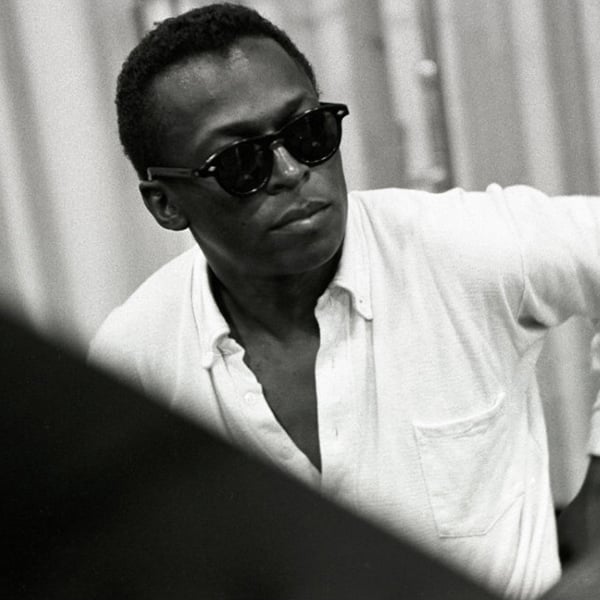
“Heavy” is a word that applies to this landmark recording in multiple ways. Jack Johnson could very well be considered Miles’ “heaviest” music, in the classic rock sense: driven by a straight-ahead, 4/4 beat drums (provided by a 24-year old Billy Cobham), with a popping, electric bass boogie line (19-year old Michael Henderson, fresh from Stevie Wonder’s road band), and a brash, explosive electric guitar sound (a 28-year old John McLaughlin taking center stage next to Miles)—as well as Herbie Hancock on a Fender Rhodes and Steve Grossman on soprano saxophone. Miles himself, on the lengthy workout “Right Off”—the first of the album’s only two tracks—blows what may be the most truculent, trash-talking solo of his career. It’s a heavy moment for sure.
Another heavy aspect: Jack Johnson was the heavyweight boxer who was undefeated between 1908 and 1915…and was black. Miles’s passion for boxing had long been a part of his mystique, and the trumpeter’s own story paralleled Johnson’s: a black man too talented and too successful for an America that reacted by being too white and too challenged. Miles created the music for Jack Johnson in two sessions in early 1970, as a soundtrack to the documentary on the legendary boxer. A year later, the album was released and the film was nominated for an Oscar.
Of all Miles’s albums recorded in the analogue era, Jack Johnson is probably the prime example of Teo Macero’s cut-n-paste approach. It sutures together different takes of different jam sections—even by different bands—into a coherent whole. “Right Off” (the opposite of the catchphrase of the day, “right on”) travels a long path, including a moment (18:44) when McLaughlin repeatedly hammers a riff from Sly Stone’s “Sing A Simple Song”, and into a series of ringing power chords, a searing saxophone solo, and further guitar ribaldry. “Yesternow” (the very title balancing past and present) opens with a more spaced-out feel, includes a snippet of “Shhh/Peaceful” from In A Silent Way (Miles literally sampling himself!) and leads to an entirely new performance (later titled “Willie Nelson”) by a band featuring Bennie Maupin on bass clarinet, two guitarists (McLaughlin and Sonny Sharock), Chick Corea on electric keyboard, Dave Holland on electric bass, and Jack DeJohnette on drums.
If Miles ever wanted to speak explicitly through his music, to make a message clear, never is he more direct than on this album. He wrote or dictated the liner notes, explaining his hero’s life and personal significance: “Johnson portrayed Freedom… the more they hated him, the more money he made, the more women he got and the more wine he drank.” In the album’s final moments, Miles plays a haunting, muted melody that could have been lifted from Sketches of Spain; then African American actor Brock Peters voices a quote of the boxer’s: “I’m Jack Johnson, heavyweight champion of the world! I’m black! They never let me forget it. I’m black all right. I’ll never let them forget it.”
















